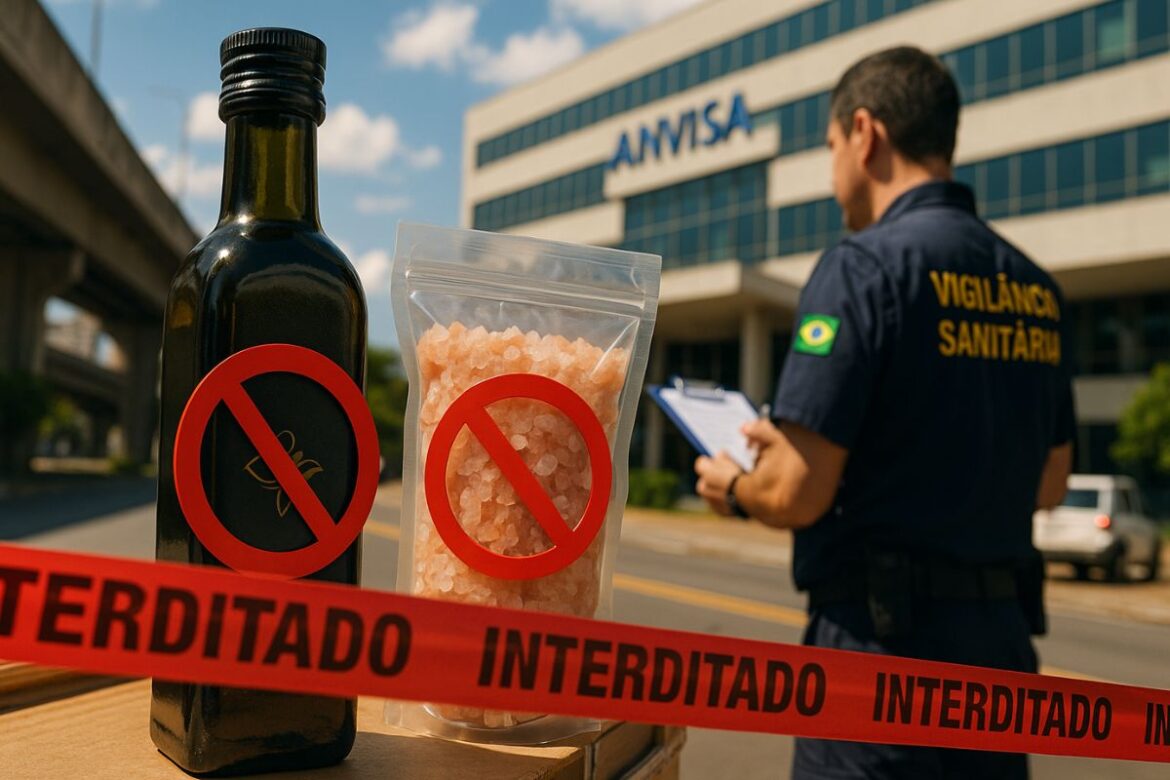Anvisa bans well-known brands and warns about risks to consumers.
Anvisa (Brazilian Health Regulatory Agency) bans well-known brands after identifying irregularities in products such as Ouro Negro olive oil and Kinino Himalayan salt, reinforcing sanitary control over food products reaching the Brazilian market that may pose a health risk.
The agency’s decision shows that even popular and widely consumed products can be subject to suspension when there are doubts about their origin, composition, labeling, or compliance with Brazilian regulations. requiring extra attention of consumers and merchants.
Why does Anvisa ban well-known brands?
Anvisa (Brazilian Health Regulatory Agency) bans well-known brands when it identifies elements that could put consumers at risk of health risks. In the most recent case, the agency ordered the suspension of the manufacture, sale, distribution, import, and advertising of Ouro Negro extra virgin olive oil throughout Brazil.
— ARTICLE CONTINUES BELOW —

The measure was taken to eliminate risks and ensure that only products with proven origin and within quality standards remain on the market.
The agency’s actions are part of a public health protection policy. When there is suspicion about the authenticity, traceability, or compliance with Brazilian standards, the product must be removed from circulation.
This is where the role of the health surveillance agency becomes visible: it acts as a barrier between the consumer and a potentially irregular item. The logic is simple: if there’s any doubt, the product shouldn’t be sold.
Ouro Negro olive oil was completely banned after complaints and analyses raised questions about its origin and compliance with Brazilian regulations. Anvisa (the Brazilian health regulatory agency) ordered the product’s complete suspension in the country.
According to the information released, the company responsible had its CNPJ (Brazilian tax ID) suspended, which compromised the legal and sanitary safety of the food and reinforced the need to stop its distribution.
This type of disqualification occurs when there is a discrepancy between what the product claims to be and what it actually is. In the case of olive oils, this is even more sensitive because there is a large volume of imported items, and not all of them can prove authenticity, acidity, origin, and labeling. When the supply chain is unclear, the consumer loses confidence and the state intervenes.
Why Kinino Himalayan Salt Was Collected
In addition to olive oil, Anvisa (Brazilian Health Regulatory Agency) bans well-known brands when it identifies composition flaws. This is what happened with batches of Himalayan salt from the Kinino brand.
Tests indicated iodine levels below those required by Brazilian law. Iodine is mandatory in table salt precisely to prevent public health problems such as goiter and developmental abnormalities.
Given the outcome, the company itself requested the voluntary recall of the irregular batches, demonstrating alignment with health regulations and consumer protection.
Nevertheless, the agency’s guidance is clear: products from the identified batches should not be consumed.
Food products that do not meet legal standards must be removed from shelves, even if they are from well-known brands.
What should a consumer do when encountering a banned product?
Upon discovering that they have Ouro Negro olive oil or Kinino Himalayan salt from irregular batches at home, consumers should immediately stop using them.
The standard advice is to keep the packaging and the receipt and contact the store where the item was purchased to inquire about exchanges, returns, or refunds. This record helps prove the purchase and facilitates the process with retailers and manufacturers.
If a consumer has consumed the product and experiences any unusual symptoms, the recommendation is to seek medical attention and inform them that they consumed a banned food product.
It is also possible to report the case to Anvisa itself through official channels. The more consumers participate in the flow of information, the faster the market adjusts.
How to identify certified and safe products.
To avoid buying irregular items, consumers need to take some basic precautions. It is important to check if the product has labeling in Portuguese, clear information about the manufacturer or importer, a legible expiration date, and, when applicable, a registration or notification number from Anvisa (Brazilian Health Regulatory Agency).
Products with no defined origin, no date, no identification of who manufactured or imported them, and that do not conform to national standards should be avoided.
Prior verification is especially important for imported foods or items sold online. Buying products with miraculous claims but without explicit ingredient information also represents a risk. Health inspectors are active, but vigilant consumers are reducing the space available for substandard products.
Why are these actions important for the market?
When Anvisa bans well-known brands, the goal is not to punish the consumer, but to protect the population and compel the sector to maintain high quality standards.
Removing irregular items from the market reinforces confidence in those who do everything correctly and prevents companies that violate the rules from competing unfairly.
These actions also prevent the circulation of products that promise more than they can deliver, such as the so-called “Miracle Tea,” cited by the agency as an example of an item lacking transparency regarding its composition. Strong oversight keeps the market healthy and prevents consumers from becoming guinea pigs.
The decision by Anvisa (Brazilian Health Regulatory Agency) to ban well-known brands such as Ouro Negro olive oil and Kinino Himalayan salt shows that food safety in Brazil remains a priority and that the origin of the product matters as much as its packaging.
Same items Wines They can be withdrawn from circulation when they do not meet sanitary standards.
Now we want to hear from you: have you ever encountered a product that was irregular or different from what was advertised on the supermarket shelf or online? Tell us in the comments what happened and if you were able to resolve the issue.


Dining and Cooking